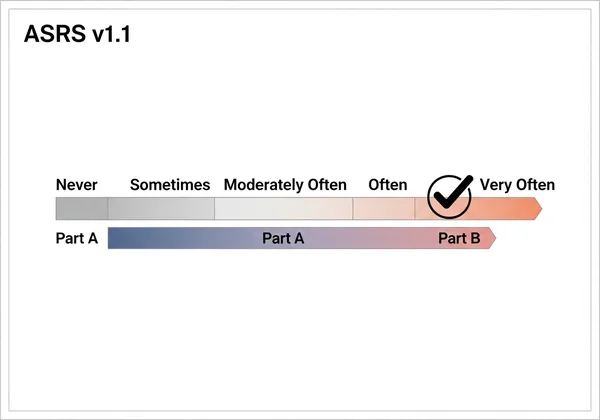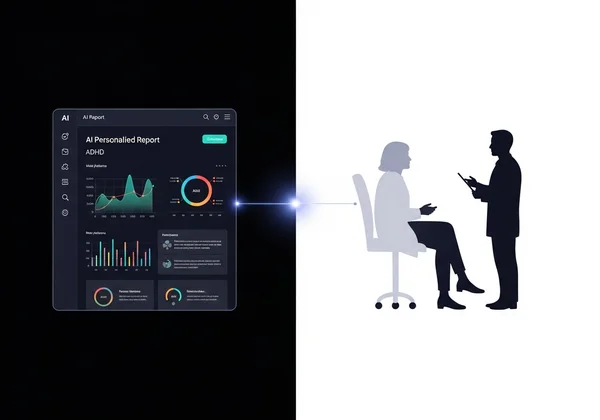ASRS Test: Understanding Your Adult ADHD Results
July 13, 2025 | By Miles Harrison
Feeling overwhelmed by your ASRS test score? You've taken an adult ADHD self-assessment, and now you're wondering, What is a positive score on the ASRS assessment? This guide will explain how the ASRS v1.1 test is scored and what your results mean for understanding potential ADHD symptoms in adults. We'll show you how to interpret your score and help you figure out your next steps. Understanding your score is the first step toward clarity. To begin your journey of self-discovery, consider taking the test at try our free tool.

Understanding ASRS Test Scoring: The Basics
The Adult ADHD Self-Report Scale (ASRS) v1.1 is a crucial online ADHD screening tool, developed by the World Health Organization (WHO) and Harvard Medical School. It offers a structured way to identify symptom patterns consistent with adult Attention-Deficit/Hyperactivity Disorder. Understanding its scoring mechanics is vital for accurate interpretation.
The ASRS v1.1 Scale: Exploring Parts A & B
The ASRS v1.1 consists of 18 questions, divided into two distinct parts: Part A and Part B. Each question asks you to rate how often you experience certain behaviors or feelings on a five-point scale, ranging from "Never" to "Very Often."
- Part A contains six questions focusing on core symptoms that are highly predictive of ADHD. These questions delve into areas like inattention and hyperactivity/impulsivity.
- Part B comprises the remaining 12 questions, which provide additional information about your symptom profile, offering a broader picture of potential challenges.
The distinction between these two parts is critical for understanding your results. For a direct and confidential self-screening experience, you can begin your screening today.
How ASRS Responses Contribute to Your Score
For each question on the ASRS scale, your response is assigned a numerical value. Typically, "Never" would be 0, "Rarely" 1, "Sometimes" 2, "Often" 3, and "Very Often" 4. The scoring for Part A is particularly important. Four out of the six questions in Part A are considered "symptom items," where a response of "Often" or "Very Often" indicates a significant symptom.
For Part A, the scoring looks for specific symptom indicators. If you score "Often" or "Very Often" on four or more of these six key questions, it suggests a strong likelihood of ADHD symptoms. This initial threshold acts as a quick screener. The combined results from both parts help create a comprehensive picture, moving beyond simple tallies to uncover deeper behavioral patterns.

Interpreting Your ASRS Score: What the Numbers Reveal
Receiving your ASRS assessment results can bring a mix of emotions—curiosity, concern, or even relief. It's important to remember that these scores offer insights, not definitive diagnoses. They serve as a guide to help you understand if your experiences align with common ADHD symptom presentations.
What Defines a "Positive ASRS Score"?
A "positive" score on the ASRS v1.1 is primarily determined by your responses in Part A. Specifically, if four or more of your responses in Part A fall into the "Often" or "Very Often" categories, this is considered a "positive screen." This threshold is a strong indicator that you might benefit from further evaluation by a healthcare professional.
It's crucial to understand that this positive screen does not mean you definitively have ADHD. Instead, it suggests that your symptom presentation warrants a closer look by someone qualified to make a diagnosis. It’s a call to explore further, not a conclusive answer.
Beyond the Score: Unpacking Symptom Patterns & Your AI Report
While the "positive screen" on Part A provides a vital initial signal, the true value of an adult ADHD selfreport scale like the ASRS v1.1 lies in understanding the complete symptom pattern. A simple numerical total can sometimes be misleading. This is where personalized analysis becomes invaluable.
On our platform, we provide more than just a score. Our unique, AI personalized report goes beyond a mere tally. It analyzes your entire set of 18 responses, identifying specific symptom clusters, behavioral trends, and areas of concern based on your individual answers. This in-depth analysis offers unique insights into how your attention, impulsivity, and hyperactivity might manifest. This advanced report can reveal nuances that a simple "yes" or "no" score cannot, giving you a comprehensive overview to get a personalized report.

Your Next Steps After Receiving ASRS Assessment Results
Discovering your ASRS test results, especially if they indicate a positive screen, can be a pivotal moment. This information empowers you to take informed steps toward understanding your cognitive profile and well-being.
Using Your Report to Guide Professional Conversations
If your ASRS test for ADHD suggests a likelihood of symptoms, the next logical step is often to consult with a qualified healthcare professional. Your personalized AI report from our ASRS test platform can be an incredibly valuable tool for this conversation. Instead of just saying "I think I might have ADHD," you can present a detailed, authoritative report based on a WHO-validated scale.
This report can help you articulate specific symptoms and patterns you've experienced, providing a clear starting point for discussion with a doctor, psychiatrist, or psychologist. It can streamline the diagnostic process, allowing your professional to delve deeper into your unique situation without starting from scratch. To begin this important journey, start your assessment today.
The ASRS Test: A Screening Tool, Not a Diagnosis
It's important to remember that the ASRS test online is a screening tool, not a diagnostic instrument. While it is highly reliable and widely used, only a qualified healthcare professional can provide a formal diagnosis of ADHD. Our online ADHD screening platform is designed to offer a confidential and immediate preliminary assessment.
Our goal is to provide you with insights and a reference point, empowering you to seek professional medical advice if your results suggest it could be beneficial. Understanding this distinction is key for accurate self-assessment, ensuring you know what the online ADHD screening can and cannot do.
Empowering Your Journey with ASRS Test Insights
Understanding your ASRS test scoring and what your results mean is a significant step in exploring potential ADHD symptoms. Discovering more about yourself can be empowering, especially with reliable information and tools to guide you. Whether you're a self-doubting professional, a concerned partner, or an academic researcher, the ASRS v1.1 test offers valuable insights.
Our platform is committed to providing a private, user-friendly, and scientifically grounded platform for adult ADHD self-screening. Our AI-powered personalized report offers a unique, in-depth analysis beyond a simple numerical score, giving you a clearer picture of your symptom patterns. We encourage you to use this knowledge as a bridge to further understanding and, if necessary, professional support. Don't hesitate to take your ASRS test and gain valuable insights into your attention and focus.
Common Questions About Your ASRS Test Results
What Does the ASRS Test Assess?
The ASRS test assesses symptoms of Attention-Deficit/Hyperactivity Disorder (ADHD) in adults. Specifically, it focuses on behaviors related to inattention, hyperactivity, and impulsivity as defined by diagnostic criteria. It helps individuals identify if their experiences align with patterns commonly seen in adults with ADHD. You can take the ASRS test to understand how it addresses these areas.
How Accurate and Reliable is the ASRS ADHD Test?
The ASRS v1.1 test is widely recognized as a highly accurate and reliable screening tool. It was developed by the World Health Organization (WHO) and Harvard Medical School, demonstrating its scientific rigor. Its reliability stems from its consistent ability to identify individuals who may have ADHD symptoms, making it a trusted initial step for many. While a screening tool, its foundation is robust. For more details on its accuracy, you can understand the ASRS accuracy on our site.
What Age Range is the ASRS Test Designed For?
The Adult ADHD Self-Report Scale (ASRS) v1.1 is specifically designed and validated for adults aged 18 years and older. It is not intended for the screening or diagnosis of children or adolescents. The questions and scoring criteria are tailored to reflect how ADHD symptoms manifest in adult life, covering areas like work, relationships, and daily functioning that differ from childhood presentations.
Does a "Positive" ASRS Score Mean I Have ADHD?
No, a "positive" ASRS score does not definitively mean you have ADHD. It means that your responses indicate a pattern of symptoms consistent with adult ADHD, suggesting that you meet the criteria for further clinical evaluation. The ASRS is a screening tool to help you determine if seeking a professional diagnosis is a worthwhile next step. It provides valuable information to discuss with a healthcare provider who can conduct a comprehensive assessment. To explore your results in depth, our AI-powered report can offer further insights.